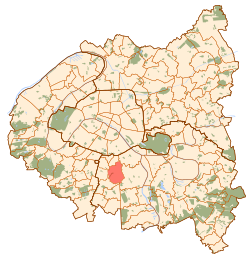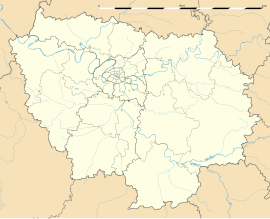Villejuif
This article needs additional citations for verification. (January 2020) |
Villejuif | |
|---|---|
 | |
 Paris and inner ring departments | |
| Coordinates: 48°47′31″N 2°21′49″E / 48.7919°N 2.3636°E | |
| Country | France |
| Region | Île-de-France |
| Department | Val-de-Marne |
| Arrondissement | L'Haÿ-les-Roses |
| Canton | Villejuif |
| Intercommunality | Grand Paris |
| Government | |
| • Mayor | Franck Le Bohellec |
| Area 1 | 5.34 km2 (2.06 sq mi) |
| Population (2021)[1] | 57,753 |
| • Density | 11,000/km2 (28,000/sq mi) |
| Time zone | UTC+01:00 (CET) |
| • Summer (DST) | UTC+02:00 (CEST) |
| INSEE/Postal code | 94076 /94800 |
| Elevation | 62–130 m (203–427 ft) |
| Website | [1] |
| 1 French Land Register data, which excludes lakes, ponds, glaciers > 1 km2 (0.386 sq mi or 247 acres) and river estuaries. | |
Villejuif (pronounced [vilʒɥif]) is a commune in the southern suburbs of Paris, France. It is located 7 km (4.3 mi) from the centre of Paris.
Name
The earliest reference to this place appears in a bull signed by the Pope Callixtus II on November 27, 1119. It refers to Villa Judea, the Latinized version of the Old French expression meaning 'Jewish settlement'. During the following centuries, the toponym appears as Villejuifve, that is, following the archaic French spelling of the expression with the same meaning, cognate to modern French Villejuive. The French author from the 17th century Louis Moréri indicates that the settlement was founded by Jews expelled from Paris. This idea, however, remains speculative: available medieval Christian and Jewish sources do not mention the existence of the Jewish community in this place. For this reason, the exact role of Jews in the inception or the development of this town remains obscure. During the 20th century, certain authors suggested other etymological explanations that are, nevertheless, even more speculative and, moreover, do not explain the known Latin and medieval French spellings.
Demographics
Population
| Year | Pop. | ±% |
|---|---|---|
| 1793 | 1,362 | — |
| 1800 | 1,137 | −16.5% |
| 1806 | 1,320 | +16.1% |
| 1821 | 1,278 | −3.2% |
| 1831 | 1,377 | +7.7% |
| 1836 | 1,652 | +20.0% |
| 1841 | 1,503 | −9.0% |
| 1846 | 1,587 | +5.6% |
| 1851 | 1,514 | −4.6% |
| 1856 | 1,559 | +3.0% |
| 1861 | 1,813 | +16.3% |
| 1866 | 2,308 | +27.3% |
| 1872 | 1,917 | −16.9% |
| 1876 | 2,117 | +10.4% |
| 1881 | 2,678 | +26.5% |
| 1886 | 3,163 | +18.1% |
| 1891 | 4,294 | +35.8% |
| 1896 | 5,234 | +21.9% |
| 1901 | 5,835 | +11.5% |
| 1906 | 6,600 | +13.1% |
| 1911 | 8,671 | +31.4% |
| 1921 | 11,725 | +35.2% |
| 1926 | 18,751 | +59.9% |
| 1931 | 25,192 | +34.4% |
| 1936 | 27,540 | +9.3% |
| 1946 | 25,359 | −7.9% |
| 1954 | 29,280 | +15.5% |
| 1962 | 46,116 | +57.5% |
| 1968 | 51,120 | +10.9% |
| 1975 | 55,606 | +8.8% |
| 1982 | 52,448 | −5.7% |
| 1990 | 48,405 | −7.7% |
| 1999 | 47,384 | −2.1% |
| 2006 | 51,739 | +9.2% |
Immigration
| Born in metropolitan France | Born outside metropolitan France | |||
|---|---|---|---|---|
| 76.1% | 23.9% | |||
| Born in overseas France |
Born in foreign countries with French citizenship at birth1 | EU-15 immigrants2 | Non-EU-15 immigrants | |
| 2.8% | 2.9% | 5.6% | 12.6% | |
| 1 This group is made up largely of former French settlers, such as Pieds-Noirs in Northwest Africa, followed by former colonial citizens who had French citizenship at birth (such as was often the case for the native elite in French colonies), as well as to a lesser extent foreign-born children of French expatriates. A foreign country is understood as a country not part of France in 1999, so a person born for example in 1950 in Algeria, when Algeria was an integral part of France, is nonetheless listed as a person born in a foreign country in French statistics. 2 An immigrant is a person born in a foreign country not having French citizenship at birth. An immigrant may have acquired French citizenship since moving to France, but is still considered an immigrant in French statistics. On the other hand, persons born in France with foreign citizenship (the children of immigrants) are not listed as immigrants. | ||||
Transport
Villejuif is served by three stations on Paris Métro Line 7: Villejuif – Léo Lagrange, Villejuif – Paul Vaillant-Couturier, and Villejuif – Louis Aragon.
Personalities
- Camille Loiseau, the Doyenne de France from 26 March 2005 to 12 August 2006, died at the Hôpital Paul-Brousse in Villejuif.
- Issei Sagawa, the Japanese killer and cannibal, was an inmate at high-security Paul Guiraud hospital in Villejuif, in 1982–1984.
- Komitas Vardapet, the founder of modern Armenian classical music.
- Vladimir Ghika, Catholic parish priest from 1923–1930, killed in Romania in 1954, beatified 31 August 2013.
Hospitals
Villejuif has several hospitals on its territory :
- the Institut Gustave Roussy, an oncology hospital;
- the Hôpital Paul-Brousse;
- the Paul Guiraud hospital.
Education
13 preschools, 11 elementary schools, and five junior high schools (Collège Aimé-Césaire, Collège Guy-Môquet, Collège Jean Lurçat, Collège Karl Marx, Collège Pasteur) are in Villejuif. Lycée intercommunal Darius-Milhaud (in Le Kremlin-Bicêtre) serves Villejuif.[2]
Other institutions:
Twin cities
 Dunaújváros, Hungary
Dunaújváros, Hungary Mirandola, Emilia-Romagna, Italy
Mirandola, Emilia-Romagna, Italy Neubrandenburg, Mecklenburg-Vorpommern, Germany
Neubrandenburg, Mecklenburg-Vorpommern, Germany Vila Franca de Xira, Portugal
Vila Franca de Xira, Portugal Yambol, Bulgaria
Yambol, Bulgaria
See also
- The leaflet of Villejuif
- Communes of the Val-de-Marne department
- Hôtel de la Capitainerie des Chasses
- 2020 Villejuif stabbing
References
- ^ "Populations légales 2021". The National Institute of Statistics and Economic Studies. 28 December 2023.
- ^ "Etablissements scolaires." Villejuif. Retrieved on June 23, 2015.
External links




